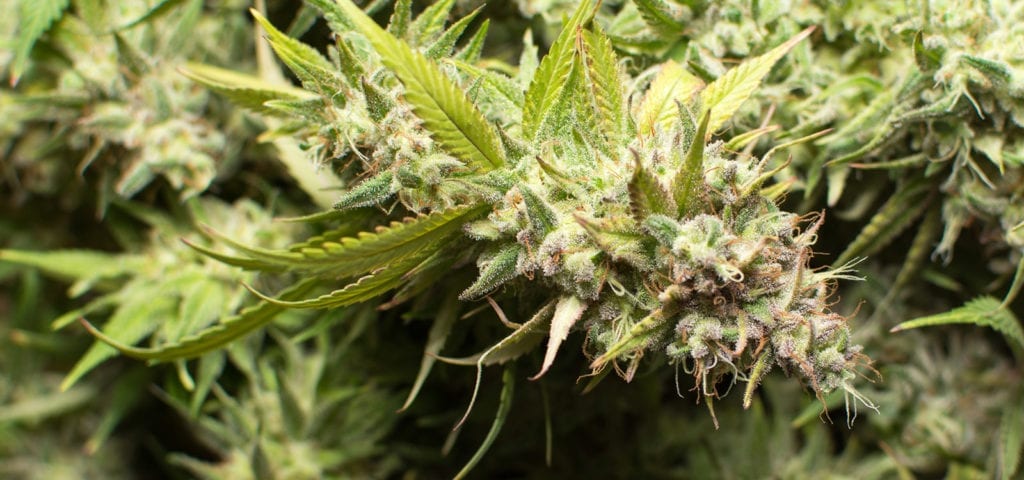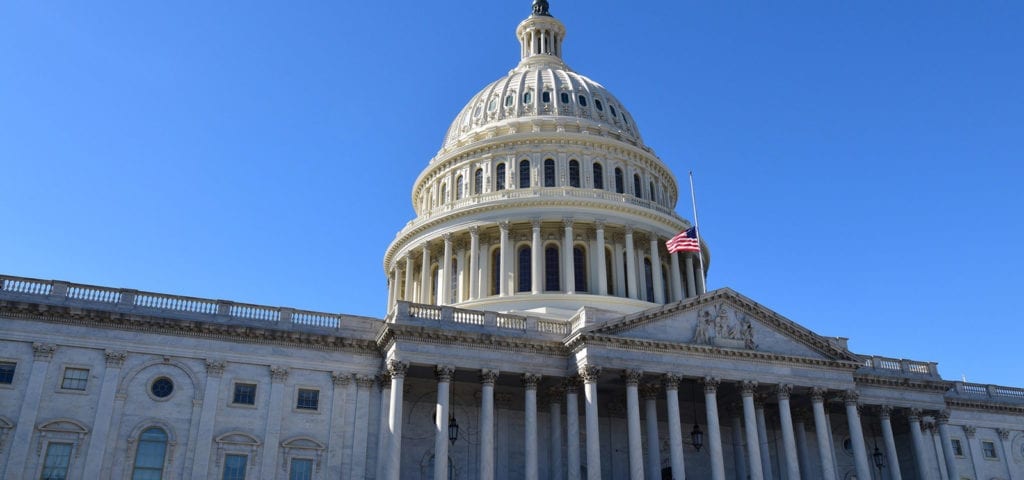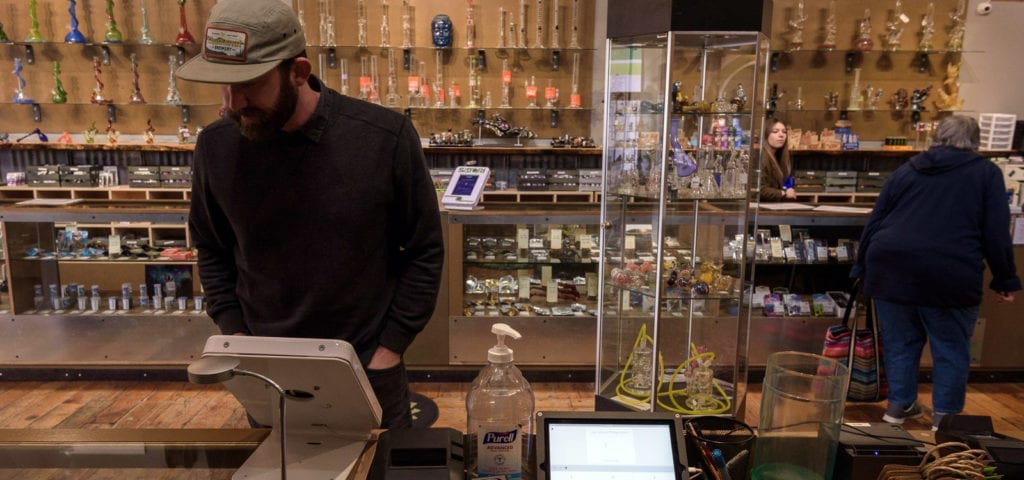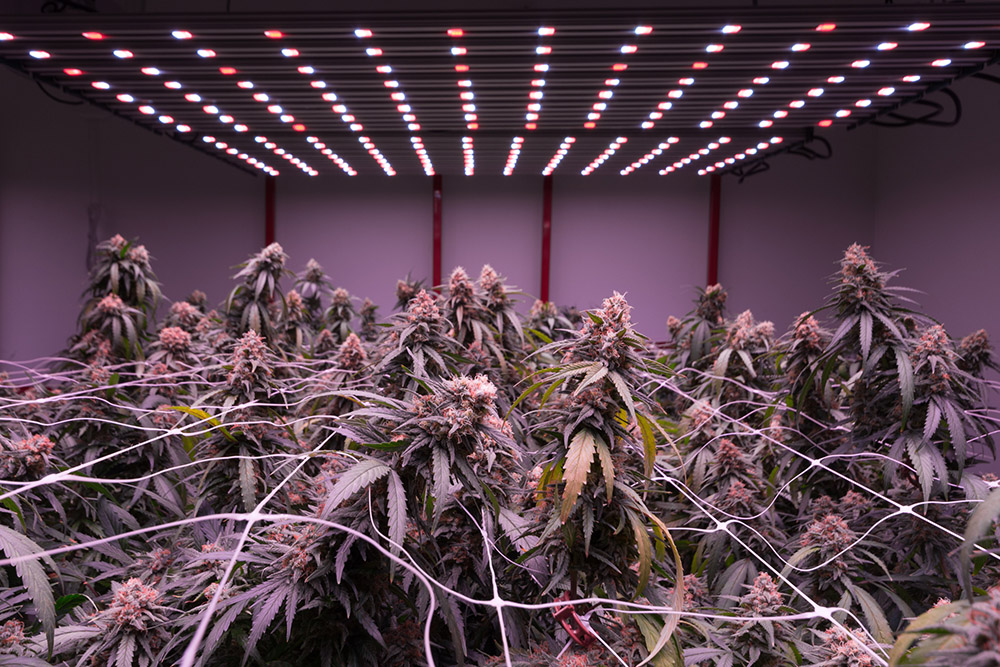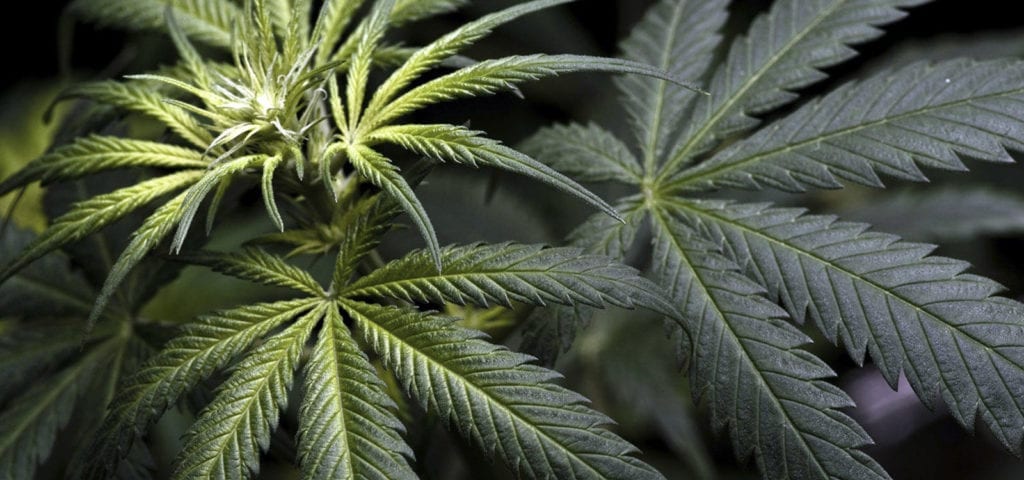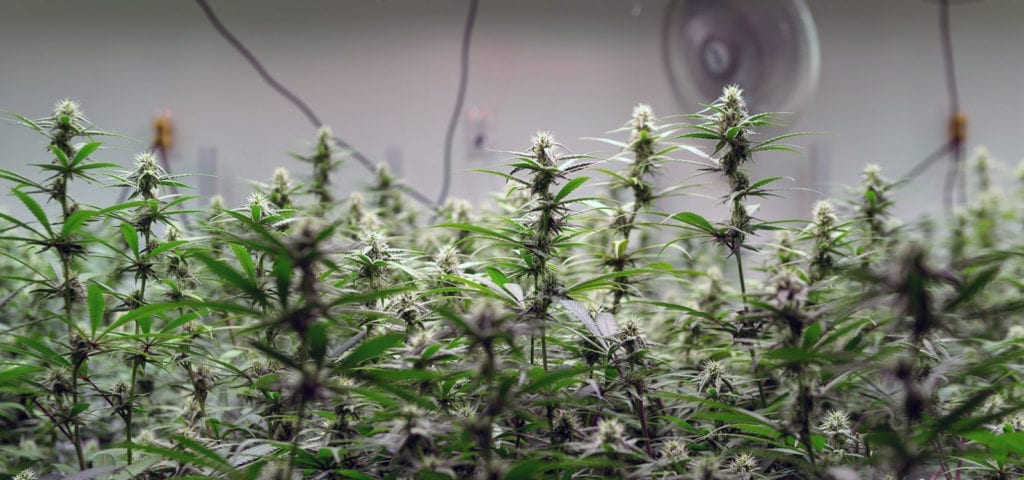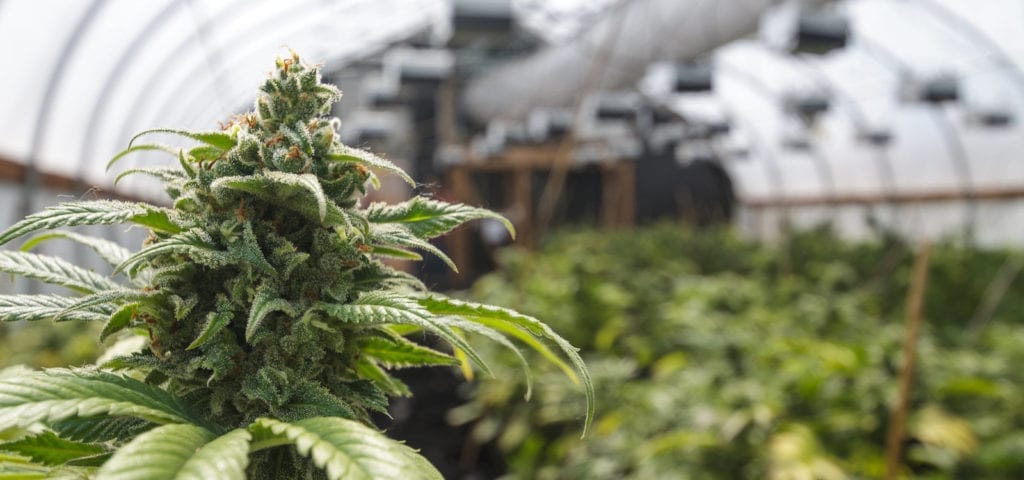It has been nearly four years since adult-use cannabis legislation took effect in Washington and Colorado, and in that time the market landscape has evolved and shifted at breakneck speed. As emerging markets in California, Canada, and elsewhere begin to take off, entrepreneurs are bound to face even greater obstacles and competition. While the first wave of cannabis entrepreneurs had to go to market essentially blind, founders and investors in new markets will now have the ability to make some level of predictions based on what has transpired.
In this special edition of the Ganjapreneur podcast, Headset co-founder and CEO Cy Scott joins Ganjapreneur co-founder and COO Noel Abbott for a conversation about how the adult-use industry has matured over the past few years, and what entrepreneurs in emerging markets can learn from the market data that now exists. The interview covers a lot of useful information for growers who are planning their go-to-market strategy, and Cy provides some great suggestions about how to use data to help drive decision-making. Headset is a business intelligence platform that provides cannabis producers and retailers the ability to easily analyze and interpret their own business data and see how it fits into the bigger picture of the market.
Listen to the podcast episode or read along with a full transcript below! For another deep-dive into cannabis industry data, check out our previous episode with Headset focused on consumer trends and purchasing behavior in the Washington market.
Listen to the Podcast:
Read the Transcript:
Noel Abbott: Hi there. I’m Noel Abbott, Chief Operating Officer of Ganjapreneur.com and you are listening to the Ganjapreneur podcast where we speak directly with cannabis business owners, activists and industry stakeholders. Today I’m back in Seattle, Washington for another special onsite edition of our podcast at Headset, a market data and business intelligence platform for cannabis industry business owners. Today I’m joined by Headset’s co-founder and CEO, Cy Scott who is also one of the original co-founders of the website Leafly. Thanks for having me back, Cy. How are you?
Cy Scott: Yeah. Great Noel. Thanks, happy to be back.
Noel Abbott: Awesome. This is the third episode that I’ve come down here to record with Headset, and for anyone who’s hearing this for the first time, I recommend you checking out the two episodes that we’ve already recorded, the first of which focused on the experience of bootstrapping Leafly, one of the most successful websites related to cannabis in the world, and we had all three of the founders: Brian Wansolich and Scott Vickers were here as well. And then the second episode focused on consumer demographics and purchasing behavior and appealing to consumers in the Washington market. So, definitely check those out if you haven’t already.
I’m really excited to get into today’s conversation because I want to dig into the big question that is facing, I would imagine, just about every entrepreneur in the cannabis industry. And that is, how can I make sure that I’m maximizing my chances for survival in this market to build a company that sustains itself and that will grow and thrive in the future in spite of so many obstacles and so much volatility?
Ahead of this interview I’ve asked you to take a look at the data that Headset has aggregated and the experience that you have working directly with producers and retailers as the market has evolved and to see if you can come up with some surface-level impressions and predictions that can help business owners in emerging markets like California and Canada and other places that are opening up, to help them plan for the future. So, before I get into the details of all of that and for anyone who may not have listened to the previous episodes yet, could you give me a quick overview of the scope of the data that we’re looking at and how it was gathered?
Cy Scott: Sure. Headset is a data and analytics company. Our mission is to help cannabis operators take a lot of the guesswork out of business decisions by leveraging data. We are able to get that data by working pretty closely with retailers, so we work directly with them, connecting to their point-of-sale systems. We give retailers business intelligence, so a good sense of what’s going on with their own internal data, sales trends, better understanding their inventory carry, what their bud tenders are selling and so on. We’re also able to benchmark against kind of market averages so they know, you know, how they’re performing and then what we do is we actually look at all those transactions in aggregate, so we anonymize, aggregate and classify and code those products to get a sense of what’s happening across a broader market from a consumer transaction angle, and so the data that we’re going to be talking about today is kind of our Washington State data. You know, right now we’re processing about 75% of every dollar that transacts in Washington. We’ve got a very significant footprint here with retailers. It was our first market. It’s our backyard given that we’re in Seattle. That said, we are in a number of other markets as well including Colorado, Nevada and Oregon. We’ll be launching our California and Canada insights later this year. Excited for that.
What’s really cool and exciting about Washington is that it’s one of two relatively mature markets given Washington and the Colorado market both legalized at the same time. You know, one of the interesting things about Washington is that they took the model, the dispensary model and kind of threw it out the window and started from scratch. It’s really interesting to kind of see this industry develop from zero to one as they say. Where Colorado had a very mature medical market with a lot of traceability, so they were able to kind of convert that into adult use, so it had a lot of legacy medical side. You know, what’s interesting is Washington has been in operations now for three solid years. More than that, but we have, you know year-over-year data across three years. So, we’re starting to recognize some really cool trends. I think you said it great, as indicators for other markets, other entrepreneurs that are looking at spaces like California and Canada, how that impacts, so we’re really excited to kind of talk about what we’re seeing here and see what kind of insights we can derive.
Noel Abbott: Awesome. So, yeah, now we’re almost four years into having a legal market in Washington, and I think it’s been about two years since the medical industry was kind of shut down by the legislature. Since then, a lot of startups have tried to hit the ground running, but due to the volatility of the market and other unforeseen challenges, many of them have either been forced to shut down or sell their business. Over the past four years, how many producers have ultimately operated in Washington, and how many are currently still operating?
Cy Scott: Sure. So, the state actually publishes license data, so we get a good sense of kind of the total number of licensee holders since initial launch of the market. It’s over 500 retailers and over a 1,000 producer/processors, closer to 1,400 since the beginning. When we look at the data that we track, we do work with processors, but we also look at what we consider brands, so processors being the product manufacturers, the license holders often will have multiple brands underneath their processing license. So, you know, we track close to 1,000 brands. Actually, you know, when we look at kind of year-over-year growth, it actually dipped about 10% this year, you know, from 990 last year to about 900 brands sold this year. Granted, we’re still in the first half of 2018, so we may see new brands coming to the market and we may end up doing better than last year, but it kind of gives you a sense of the number of brands that have been sold in retailers in 2018, about 900. So, you’re looking at about 1,400 licenses. That’s across producers and processors, so the wholesale kind of growers. Some have producer and processor licenses, but when we look at the brands that consumers are purchasing, about 900 is kind of where we’re at today.
Noel Abbott: Do you think that’s an indicator that the market’s reaching it’s point of maturation where the ability to support that many brands is being tested?
Cy Scott: I do think so, and a lot of that is reflected in some of the growth numbers we’re seeing. When we look at 2016 versus 2015, you know, we had over 100% year-over-year growth. When we look at 2017 versus 2016, it’s dipped down to about 33% year-over-year growth, and then when looking year-to-date, we’re just over 10% growth this time last year, so you’re starting to see some maturity of the market. The growth is still great and very strong.
Noel Abbott: Just slowing down.
Cy Scott: It’s slowing down, exactly. Exactly. So, I think that there is saturation of brands given that processors are often producing multiple brands, sometimes downmarket, value-priced brands, and there’s upmarket, more premium-priced brands. Everyone’s kind of trying everything, seeing what will stick. I think that now given that there’s been a number of years that some of these brands have been in the market, certain brands are getting sunsetted as they haven’t been performing. You know, there could be a limited retailer appetite given that they have finite shelf space. They can only carry so many brands. And a consumer can only juggle so many brands in their head and remembering who’s who. So when you’re talking about, you know, 900 brands for sale on the market, that’s a large number. I think all those factors could be impacting that. That said, by the end of the year, maybe we break 1,000 and maybe we see some more brand growth, but we don’t really expect it to continue.
Noel Abbott: At the rate that it’s been?
Cy Scott: Exactly.
Noel Abbott: Do you know if there are license holders that have had their licenses from the beginning and have still not put it to use for a brand?
Cy Scott: That’s a good question. We don’t know that from the data that we see directly, given that our data comes from the retailers, but you know, we have heard of such cases. We’ve also heard of license holders that have transferred licenses, of consolidation, things like that.
Noel Abbott: That’s one thing that I’ve heard a lot of is while companies may be going under, the company, it doesn’t necessarily die. It just has new owners and gets acquired by another company so that the brand can live on even if the original conception of the business didn’t make it as planned.
Cy Scott: Exactly. As far as we know in Washington, I think there’s only been one producer/processor license that’s been completely retired and hasn’t been transferred or sold. Yeah, so that’s pretty interesting. I think kind of to that brand point, we’re seeing a lot of these larger brands taking more and more of the market. Some recent numbers, this year we’re seeing the top 10 brands taking 20% of the market, which is pretty interesting, given so many licenses that are out there when you’re looking at just 10 brands taking down 20% of the market and in a market like Washington, which is over $1 billion in sales each year. That’s a big amount of the market.
Noel Abbott: Yeah. Well, let’s talk about pricing and the behavior of prices as the market has matured. Prices have fluctuated quite a bit since legalization took effect both on the retail and the wholesale side. What was the timeline of the major trends in this regard, and did you notice a consistent correlation between retail and wholesale prices or have you heard that they were related or did they fluctuate independent of each other?
Cy Scott: Sure. So, you know when the market first launched prices were very high. Supply was very limited, so that’s just kind of the natural byproduct. That’s something that you hear about in markets like California where people are complaining about taxation of the product and the high prices. I mean, it really is just a supply-and-demand problem in the near term. You know, we saw some very significant price decreases in 2016 and 2017 at the retail level. You know, at this point, prices have stabilized quite a bit. That said, we’re looking at it from the retail side of the business and from the processor/distributor/vendor/wholesale to retailer. We have heard of grower prices, price per gram or per pound kind of continuing to decline, but at the retail level prices have stabilized somewhat. Overall, average item price has dipped a bit, but we see more people purchasing more products, so basket size is essentially the same. So, a basket, you can think of like a transaction. Basket has been pretty consistent, you know about $30-32 per transaction.
Noel Abbott: So people kind of know in their mind potentially, that they’re going in, with this amount of money to spend, that they’re going in with a fixed budget.
Cy Scott: Exactly.
Noel Abbott: That behavior hasn’t really changed at all?
Cy Scott: Exactly. Yeah. They have a planned spend and they’re just purchasing more products at the transaction. We also see, you know, margins, and margins are roughly 50-55% across all the categories that we track. It varies category to category, but that’s kind of a good ballpark. So, you know, pricing is holding, so I think at the retail side, you know, they seem pretty happy with the margins. I mean, those are good margins for retail. You know, the processors are hopefully able to produce the product at the rate that they’re generating some good margins. Again, we don’t really have visibility in the wholesale side of the business, but at the retail side pricing has kind of stabilized and we expect it to kind of stay right where it’s at for the foreseeable future.
Noel Abbott: Yeah. I’ve definitely heard from a lot of growers that there has been a “race to the bottom” in terms of the wholesale prices and I even saw recently on Facebook someone had said that they noticed an order had been placed for flower at just 20 cents per gram. While you may not have the data to look into those transactions and identify the trends, what do you think might be the main factors to cause prices to drop so steeply, and do you think that this is going to just kind of be the new normal, or is it going to get worse, or is it just a temporary phase that will get sorted out?
Cy Scott: Yeah. That’s a good question. I think it’s probably a few things. One of them is some of the scale we’re seeing from the larger brands probably putting price pressure on the growers or economies of scale, you know. Maybe it’s 20 cents a gram, but maybe they’re selling quite a bit of bulk product. You know, I think that’s one area. I think there’s probably too much production if we’re talking 20 cents a gram wholesale price. That’s pretty low. You know, while it is becoming a mature market and we’re three years into it, there’s probably still some changes that we can expect to see. Maybe some more consolidation on the growth side. But, yeah, that is a low price and I do think it has to do with you know probably these brands, these processors driving the price down. They’re probably needing to keep their wholesale cost or their supply cost in line so they can get those margins to the retailer so that might be putting pressure on the growers themselves. Hopefully it stabilizes for those growers. Hopefully there continues to be more increase in demand. I’m not sure how many more licenses are going to be issued on that side, but you know, I would think they’d probably want some limitations around that as well to help maintain some of that wholesale pricing.
Noel Abbott: Have you noticed the volatility and the tumultuous nature of the market affecting different types of producers and different business models differently? For example, are there certain product categories that have proven themselves to be more or less secure than others?
Cy Scott: Yeah. I think that, you know, we track about nine categories of products right now and that’s everything from flower to pre-roll, concentrates, vapor pens, capsules, tinctures, topicals. It’s a wide variety of products. I think that what we’re seeing is certain categories like flower continuing to lose market share. That said, there’s still well over 50% of sales go to flower product, but flower, it’s an interesting category. That has the largest amount of brands in that category. I think the barrier to entry is the lowest, right, because it’s the product and the curing process and the packaging is relatively simple compared to maybe producing an edible. You know, with an edible you have to have not only the packaging and processing, but some sort of recipe. You know, you need a commercial-grade kitchen facility that’s licensed to be able to produce, so harder to …
Noel Abbott: Not to mention all of the knowledge and the experience that would be separate than people who have been growing forever may already be familiar with. They’re kind of inventing a whole new commercial operation when you get into the really complex edibles and processed products.
Cy Scott: Totally. I mean, that’s exactly it. The same thing with things like vapor pens and concentrates. I mean, the extraction process can be complex. There’s a variety of ways of doing it. There’s technology involved. There’s quality control. That’s stuff that you know you don’t get at the same level with flower. That said, you know, flower is very versatile. You know, it’s very popular, arguably a richer experience for many given kind of the nuance of the strain and the flower production, but we are seeing a little more stability in some of the more complex categories like edibles and vapor pens. Not to say that they’re not challenging and there’s not competition. It just doesn’t seem to be at that same rate that you see in flower. So, you know, if we had to pick a category that’s a little more secure it might be one of those that does require some additional knowledge, some additional labor to produce the product versus something like flower.
Noel Abbott: Do you think that the lower number of brands may also have something to do with the security from a consumer’s perspective to, that it’s easier to develop brand loyalty perhaps?
Cy Scott: Absolutely. You know, it’s just you recognize a brand and you like the flavor of the edible. Maybe it’s a low-dose mint and you like the taste and the consistency, so you might go with that brand. The flower purchasing process is a little bit different. You kind of walk in. If you have some idea of a strain you might be interested in or even a processor, you might want to know what new strains are available. Often, you know, retailers don’t carry every strain that a processor produces, so you’re always looking for what’s new and maybe you like a particular strain and that brand has run out at the retailer, so you’re looking for a comparable from another brand and it’s easy to kind of jump and you get introduced to a different brand. That can be harder for something like a vapor pen or an edible, beverage, things like that where the replacement is not as simple.
Noel Abbott: Right.
Cy Scott: I think that definitely does have an impact on some of that security for sure.
Noel Abbott: Now that we’re in this phase in the market where there are companies that have kind of been duking it out and fighting for market share for several years, what do the most successful companies that have been operating since the early days seem to have in common with each other?
Cy Scott: Sure. So, I think when we look at those large brands that are very successful there’s a couple common factors, one of which is distribution, so having a broad reach. You know, since we’re talking about the Washington market, Washington State, those that aren’t’ familiar, kind of has a western part of the state and an eastern part of the state and so it’s the operators that kind of cross both parts of the state that have the largest retailer footprint seem to do really well. Also, those larger brands are producing multiple categories of products, sometimes all categories where from flower to pre-roll all the way to edibles and beverages. So, I think having product diversification is critical as well. It also just positions yourself nicely to see if there’s certain trends maybe. It is at low-dose edibles.
Noel Abbott: It’s easier to make adjustments as you notice changes in the industry.
Cy Scott: Exactly. If you’re strictly a flower producer and while flowers command such a large majority of the market the growth rates aren’t there and you see growth in vapor pens or we see 30% year-to-date year-over-year growth and you want to also make a vapor pen, that can be tough to do if you’re not already invested in that. So, that is one of the trends, is just continuing to invest in your product, product selection, product catalog, what you’re producing, what you’re giving customers. I think customers, as they start to gravitate towards these brands, you know, we’re still kind of early for brand loyalty, but as you do start to identify with maybe a certain brand, if you know that they’re producing other categories of products then you’re going to continue to purchase from that brand versus, you know, going to a competitive brand because it’s a different category of products.
We see trends in transaction data where certain categories like beverages are often purchased alongside another category. So, people, when they go to a store aren’t necessarily always just purchasing a basketful of beverages. They’re usually a throw-in item, not necessarily that store driver that gets you there or flower is a little different. You know, flower is something that people, when they purchase flower, often they’re only purchasing flower. So, if you know that beverages go well with other products and you maybe sell one of those other products, it’s great to look at making a beverage, right maybe something complimentary. That’s some common trends. I think customer education, so the brands that are really investing in marketing, albeit marketing can be difficult in this industry, but trying to educate the consumer about the nuances of their product, the benefits of their product, I think that’s helpful. I think some of the larger brands you see, you know, nice packaging. You know, good branding really stands out on the shelf space there at the retailer, which is critical, and arguably a way to market given that we can’t do television advertising or even digital advertising on things like Facebook or Instagram is very difficult.
Noel Abbott: Right. People are having their social media accounts shut down left and right.
Cy Scott: Constantly.
Noel Abbott: Even when they say, this is not for sales. They’re just photos.
Cy Scott: Exactly. So, having great packaging is important from a marketing perspective, and that is another kind of trend that we see with some of the larger brands in the market.
Noel Abbott: I’ll admit, you know, I like to think that I purchase based on examining the product itself, but it’s so difficult in Washington because you can’t actually take it out and look at it and smell it, so I’ve definitely been convinced by packaging. Just like: “Oh, this looks new. That looks different. I’ll give that a try.”
Cy Scott: Totally. Totally. Packaging. Budtender recommendation, what they’re hearing is always another driver. You know, so if the brands are working with the budtenders, you know, helping educate the budtenders, doing outreach I think is pretty important because they do kind of maintain that relationship with the consumer when they come in. So, those are just some parallels that we see for sure across these larger brands.
Noel Abbott: Yeah. A lot of producer/processors in Washington have told me how difficult it is to actually get your products into the retailer shops because they’re being solicited nonstop, retailers and bud tenders. They have all of these different brands trying to give them samples, trying to push their product to get that shelf space, and it’s really hard to break through the noise. Even if you have unique selling points it doesn’t really matter. There’s just such a saturation that everybody’s really wary of being pitched and nobody wants to commit to anything. With that in mind, what are some things that you think producers can do to kind of gain an advantage and really help their brand be the one that gets through to the retailers and the bud tenders and is the one that, you know, sticks with them?
Cy Scott: Yeah. That’s a great point. It can be difficult. You know, when you think about a retailer, you know, they have finite shelf space, right. They only have so much real estate, so much room in the display cases or on the wall behind them. You know, we help retailers through the business intelligence side of what Headset does to really help them optimize their inventory, optimize, you know, the products they carry so that they can better determine when products maybe should be sunsetted or they should discontinue certain brands over others. Hopefully, that starts to generate opportunities for some of these new product manufacturers that are coming to the stores. But, you’re right, it can be a hard selling point, right, especially if you’re producing flower and it’s a Sativa strain and maybe it’s a strain that they already sell from another vendor. It can be difficult to kind of crack that retailer to get into that store. So, you know, we think that there’s things you can do as a product manufacturer that will help. Obviously, you need to have great product and consistent supply, you know, good price point, but if you can provide a little more value to the retailer I think there’s a lot there as well.
One of the services that we have at Headset we call Headset Bridge, which essentially is a vendor-managed inventory platform. We have a lot of retailers that leverage that system and work with product companies to be able to share data back to those vendors specifically, their inventory, their price point, their sales velocity and the vendors, the product manufacturer uses that information to better support the retailer. As you can imagine, a retailer is very busy. You know, a lot of them have a lot going on. They’ve got inventory managers sometimes. Sometimes the inventory manager is the store owner, you know, juggling a lot of things. So, if you can go into a story and say, not only will I give you consistent product that’s well regarded, but I can also provide additional services and make sure that you never run out of stock because I can do vendor-managed inventory and make sure that you’re always well supplied with that Goldilocks amount of inventory, you know, not too much, not too little. You know, that’s valuable for them. Maybe you want to run a promotion and you can cross promote that retail location.
Headset Bridge allows you as a vendor to measure the impact of that promotion and to really show ROI to the retailer to say, look, this is my advertising spend and this is what I’m doing out there, and this is how much it drove sales at your store.
Noel Abbott: Not only are you doing these kind of co-marketing efforts, but you’re also able to demonstrate that they’re having an effect.
Cy Scott: Exactly. Again, it comes back to just the retailers being very busy, right. If they do determine, I’ll carry some of your products to see how it does, you can show, you know, right away, kind of ROI there. So, I think coming to a retailer with a great product, but also some value-add services goes a long way to making sure that you can keep that shelf space or get that shelf space in the first place.
Noel Abbott: Awesome. So, looking ahead at some of the new markets that are coming online, obviously California is going to be huge. Canada is going to be huge. I think they’re actually about the same population wise, about 40 million people, compared to Washington and Colorado, which are, you know, 4 to 5 million. How do you anticipate the growth in these new markets will differ from Washington’s growth and how will the differences in the regulatory structures affect this?
Cy Scott: Sure. Yeah. That kind of goes back to the topic that what’s exciting about a market like Washington or a market like Colorado is it’s a good lens into the kind of future into a market like California or Canada. Given California has had a market for a long time, you know, from the medical world, but you know, this is the first time that they’re able to sell adult use, you know, 21 and over without a doctor’s recommendation. So, you’re going to see some changes. I think that you’ll probably see a lot of patterns.
The product category sales like we see now where things like flower in the beginning of a market drive a huge percentage, 90% of sales. In a market like Canada, right, where they’re going to go online this year selling only flower and tinctures, obviously given that it’s really pretty much only flower, most of the sales are only going to go to flower, but as they start to introduce some new product categories based on upcoming legislation, so being able to sell edibles and vapor pens you’re going to see kind of a shake-out where flower is, you know, 50% of the market, edibles 10% of the market, concentrates about 10% of the market and so on. So, you’ll start to see some of those same patterns happening. You know, California already somewhat has that. You know, they’re converting a lot of the medical products now. There’s that six-month grace period where they’re able to sell. We’re still within that in the first half of 2018. You know, that will probably change once all the licensing structure is finalized and licenses have been issued at which point you’re probably going to see numbers more in line with what you see in Washington and Colorado around percentage of market going to certain categories.
We’re probably going to see the same pattern with a number of larger brands taking a large percentage of the market. You know, if you can think about, like you said, the population differences, I mean, six, seven times the population, six, seven times probably market size, so you’re looking at $6, 7, 8 billion dollars a year in sales for California and the same thing for Canada. If 20% of that market is going to 10 brands, that’s a sizable amount. And those 10 brands that I mentioned earlier are not all created equal. It’s not divided up equally, so there’s some big winners in that. So, expect to see that as well. It’s to be determined who those brands are going to be. In a market like California you have some legacy medical brands that had good reach, had good dispensary footprint and continue to have that, although I think they’re going through …
Noel Abbott: They have a consumer following as well.
Cy Scott: Exactly. Consumer following from the medical days, so that will carry some significant weight going forward, so we can expect them to continue to be leaders. But, in a market like Canada where there are like LPs, licensed producers that are in the medical market.
Noel Abbott: It’s a lot more strict in terms of who they’re issuing these licenses to and there’s a lot fewer of them going out, right?
Cy Scott: Exactly, and their audience, I think the Canada medical patient count is roughly 250,000 patients for the entire country. You know, they’re kind of starting over in a lot of ways, probably not a lot of consumer sentiment or people that know those brands immediately like maybe in California where they might. So, that’s going to be quite interesting to see how that shakes out. California has an interesting model with distribution and Canada as well, so that will be interesting to see how that impacts these brands and these product manufacturers. In markets like Washington and Colorado a lot of the distribution is done directly by the processors themselves. So, as they go to a more traditional distribution model, it will be interesting to see how that helps or hurts potentially the processors given that they might not have that direct relationship with the retailer. That relationship may exist through the distributor. You know, that could be interesting, but it also provides benefits because the product manufacturer can focus on manufacturing products, not logistics in distribution. So, that will be a interesting dynamic to see how that changes the landscape versus a market like Washington and Colorado.
Noel Abbott: I wonder how much leverage the distributors are going to have over which brands get placement on the retail side of things as well.
Cy Scott: Exactly.
Noel Abbott: It’s kind of like in Washington producers are almost responsible for their own placement to a degree. You know, they’re the ones out there selling their products to the retailers, but then in California they may have to hand that responsibility over, which might be a scary thing to do.
Cy Scott: Yeah. Exactly, especially given the limited marketing abilities a lot of these processors have. They leverage the in-store displays and positioning to really be that marketing channel for them. It will be interesting to see how that plays out. We’ve seen things in Canada. There’s a lot of press coming out of Canada given some of these LPs are publicly traded. You see a lot of press releases and news about deals that LPs are making with retail outlets, investments they’re making in retail outlets to try and build that relationship because I think that they’re aware that the distributor will own it in a lot of ways, so they’re trying to create relationships to continue that. But, that’s something that we’re excited to see how that will play out. Another nuance of those markets that will be interesting in California and Oregon, you have the delivery model, which has existed for medical, but to see what that looks like in an adult-use market is new and something that Washington and Colorado do not have. And then to that point, in Canada there’s going to be eCommerce in many provinces, not all provinces I believe. Some provinces will be government-run eCom. Others will be private. Some will be a hybrid.
Noel Abbott: Is that where you place the order online and it gets shipped to your house or would you go pick it up at a pharmacy?
Cy Scott: It gets shipped to your house.
Noel Abbott: Okay.
Cy Scott: Given that Canada will have federal legalization this year, they can do more traditional eCommerce, so the Amazons of the world could technically sell Cannabis. Well, maybe not technically. Maybe they’d have to have a license to do it, but similar situations where you go online and you go to a website. You add things to your cart, you check out and it’s delivered much like you can purchase alcohol online in the US. That will be an exciting dynamic. And then we’re really looking forward to seeing what kind of brands come out of these new markets. You know, we see news in Canada of LPs building out their adult-use brands. Kind of, they’re already starting to get ahead of it. Given that it’s going to be just flower and their tinctures that they’re able to sell now, it will be interesting to see what happens to that market as the legislation loosens up a bit. You might have seen some of the news about the packaging restrictions. It’s all plain-color packaging, small logo, which is very different than what we’re talking about in Washington where packaging is a different way for brands to stand out. So, a lot of exciting stuff ahead and we look forward to working with retailers in these markets to be able to see what’s really going on.
Noel Abbott: Yeah. Another thing I could see being very different in the upcoming California market is just the allowance of investments. I know in Washington it was pretty strict when the market launched. You had to be a resident for so many years and they weren’t just allowing anybody to come in and invest in the industry, but I think in California it’s wide open and the legacy growers and people who’ve been operating in the industry for a long time are just going to be flooded with all these new, competitive, well-backed companies. It’s definitely going to be a difficult time and a very competitive market for sure.
Cy Scott: It is. It is. Yeah. It’s definitely a double-edged sword, you know. You want more capital coming into the space. I’m sure those legacy growers that have been doing it for a long time, they’ve been starved for investment.
Noel Abbott: Yeah. They’re going to be able to take that investment money.
Cy Scott: Exactly. Exactly. It’s kind of making sure that they can get that investment money and put it to good use to maintain their positions and scale their businesses and then on the flip side of that the new people coming into the space that might not have the experience in the cannabis industry, you know, they need to be able to take that capital and make smart decisions with it because, you know, cannabis, while it is, as we see in mature markets like Washington, playing out very much like other consumer packaged goods, it does have its nuances, right. It’s a very unique product and I know we create parallels to things like alcohol in a lot of ways, but it’s more than just alcohol, right, when you’re talking about things like topicals, you know. It kind of like, just in that example, starts to push into like skin care.
Noel Abbott: Right. It’s not just a recreational substance in a lot of ways. It’s a therapeutic substance. People use it for all kinds of things.
Cy Scott: Exactly. So, coming to the industry from one lens, one framework, it’s more nuanced, so the people that will be coming in now that investment is allowed in markets like California, hopefully they can identify that and stay competitive. On the other side, the ones that have been in the business for a long time are able to scale their operations in this kind of new world that we’re all operating in.
Noel Abbott: If I’m a producer startup in one of these new markets such as California, what things should I watch out for in terms of industry trends and what should I beware of in terms of the direction that the market’s heading and how that can affect my business and are there steps that I could take to kind of mitigate the risks associated with that?
Cy Scott: Sure. Yeah. So, we definitely recommend everyone utilizing data to drive their decisions. You know, it used to be okay long ago to just say, I’m going to make an edible and I’m going to package it like this and it’s going to sell well. That’s definitely not the case now. So, you know, definitely looking at the data and as far as what data to look at, I think it’s great to start at a high level at the category or segment level, right, so really determine are you going to be producing a vapor pen or should you focus on a pre-roll, and if it is a pre-roll should you be looking at connoisseur pre-rolls versus multi packs or single-gram pre-rolls and then once you kind of determine where the opportunity is by looking at not only the market share, but the growth rates of those categories, I would start to look at the competitive landscape and find other operators there. Who’s going to be the competition? Who’s there now that’s producing in that subcategory that you’re looking at? What products are they selling that are doing well? Why are those doing well? What do their margins look like? Then start to look at things like price elasticity and finding out, you know, where can you price your products that fit the market.
If you’re new to the market maybe you compete on price. Maybe you’re a higher price because it’s a more premium product. I think looking at those numbers is a really good starting point to building that brand. So, I would start at kind of the category market share. You know, look at percentages. Look at the number of operators that are in there. Look at where the majority of the sales are going. Look at new product introductions. We’ve got great dashboards for that where a new product comes to market. We highlight it. We talk about how well it’s doing immediately so you can kind of start to dig into that and see kind of if it’s something maybe noisier than other categories. Maybe jump to those categories. There’s a lot of categories like the capsules, the tinctures and topicals that have very high growth rates, but have very small market share right now, you know, 1-2% of the market. You know, maybe that’s where you want to be. Maybe you want to be scale, produce a little bit of everything if you can. It’s a very costly endeavor. It takes a lot of expertise. You know, it’s easier said than done, but I would definitely attempt that because it seems like scale is where you’re going to really win.
Noel Abbott: You’ll have that ability to make pivots as needed or to identify the areas that are performing best for you.
Cy Scott: Exactly. And then from there I would look at services, value-add that you can provide, and not just the product you produce, but also the services that you’re able to provide your retail customers as a big differentiator as you go to market.
Noel Abbott: Well, Cy. Thanks for having me. Unfortunately, that’s all the time we have for today. Thanks again for the opportunity to come down here and record the show and for sharing your insight on the growth and the maturation of the Washington market and what we can expect in the emerging markets.
Cy Scott: Yeah, thanks. Pleasure to be here.
Noel Abbott: This has been a special edition of the Ganjapreneur.com podcast. You can find our podcast on our website Ganjapreneur.com as well as iTunes, SoundCloud, or wherever you download podcasts. I’m Noel Abbott. Thank you for joining us.
